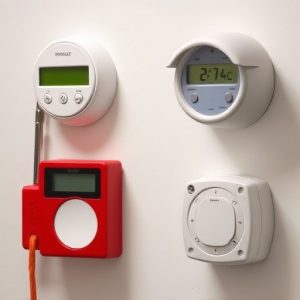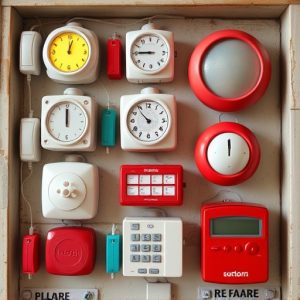Personal Safety Alarms: Protection for College Students’ Peace of Mind
Personal safety alarms for college students are compact, portable devices designed to emit loud, hig…….
Personal safety alarms for college students are compact, portable devices designed to emit loud, high-pitched sounds (100+ dB) up to 500 feet, cutting through campus noise and alerting others in emergencies. The choice of alarm depends on desired features like GPS tracking, automatic fall detection, stun functions, LED flashlights, and battery life. To maximize effectiveness, position alarms around your neck or clip them to bags, test them regularly, and activate only when unsafe. Proper maintenance, including testing and battery replacement, ensures the alarm's howl can be heard up to 100 feet away, providing peace of mind during college years.
Personal safety alarms are essential tools for college students, offering a sense of security in an often unfamiliar environment. Understanding these devices and their capabilities is crucial for ensuring personal well-being. This article explores the various aspects of personal safety alarms, from their role in campus safety to decibel levels, different types, usage guidelines, and maintenance tips. Learn how far your personal alarm’s sound can reach and equip yourself with knowledge to make informed choices for your safety.
- Understanding Personal Safety Alarms: Their Role for College Students
- The Importance of Decibel Levels: How Loud is Enough?
- Types of Personal Alarms: From Basic to Advanced Features
- Where and When to Use Your Personal Alarm
- Maintenance and Longevity: Ensuring Your Alarm Stays Reliable
Understanding Personal Safety Alarms: Their Role for College Students
Personal safety alarms are compact, portable devices designed to signal distress and alert others in emergency situations. These alarms play a pivotal role for college students navigating unfamiliar environments and late-night walks between classes or residential buildings. With a simple push of a button, these devices emit loud, high-pitched sounds that can travel up to 500 feet—ensuring your presence is known should you encounter any danger.
Understanding the range at which personal safety alarms operate is crucial. The typical alarm sound project is designed to be heard over ambient college campus noise, attracting attention from nearby passersby or residence hall staff. This immediate notification system can serve as a powerful deterrent against potential threats and help ensure prompt assistance in an emergency situation.
The Importance of Decibel Levels: How Loud is Enough?
Personal safety alarms for college students must consider decibel levels, crucial in ensuring their effectiveness. The alarm’s loudness plays a significant role in its range and ability to capture attention quickly. Alarms designed for personal safety should emit sounds exceeding 100 decibels (dB), which is the recommended threshold for alerting individuals without causing hearing damage.
Understanding how far a personal alarm sounds is essential, as it determines the level of protection offered. Higher decibel levels project louder sounds over greater distances, making them ideal for college campuses where students might need to quickly alert others in crowded or remote areas. This feature can serve as a powerful tool for deterring potential threats and summoning aid when needed.
Types of Personal Alarms: From Basic to Advanced Features
Personal alarms for college students come in a variety of types, each with distinct features catering to different needs and preferences. Basic models typically offer a loud, attention-grabbing sound that can reach up to 120 decibels—enough to startle potential attackers and attract help. These simple devices are often pocket-sized and easy to carry, making them convenient for everyday use on campus.
Advanced personal alarms take functionality to the next level with features like GPS tracking, automatic fall detection, and long battery life. Some even incorporate stun functions or LED flashlights to enhance self-defense capabilities. These devices can send alerts to emergency contacts or local authorities, providing an extra layer of safety for students navigating isolated areas on campus or during late-night walks home. The advanced features not only offer greater peace of mind but also ensure swift response in case of emergencies.
Where and When to Use Your Personal Alarm
Personal safety alarms for college students are a crucial tool, especially in unfamiliar environments or late-night walks. When using your personal alarm, it’s essential to know its range and how to maximize its effectiveness. Place the alarm around your neck or clip it to your bag, ensuring it’s easily accessible. Test the alarm before leaving your dorm or campus area to familiarize yourself with the sound and ensure it can be heard clearly at a distance.
Use the alarm in open spaces where your voice won’t carry, such as narrow alleys or dimly lit corridors. The howl of a personal alarm typically ranges from 120 to 150 decibels, loud enough to startle potential assailants and alert nearby friends or security personnel. Remember, timing is key; activate the alarm when you feel unsafe or need immediate assistance, not as a preventive measure.
Maintenance and Longevity: Ensuring Your Alarm Stays Reliable
Personal safety alarms for college students are a smart investment, but their reliability hinges on proper maintenance. Regularly test your alarm’s functionality by simulating an emergency—this ensures it’s in top condition and ready when needed. Additionally, keep the device clean and free from debris to maintain optimal sound projection, ensuring that the howl of your personal alarm can be heard clearly up to 100 feet away, as advertised.
Longevity depends on consistent upkeep. Replace batteries promptly when they start to show signs of weakness or after a certain period, typically every 6-12 months. Follow the manufacturer’s guidelines for best results and remember that proper care will extend the life of your alarm, providing you with peace of mind throughout your college years.
Personal safety alarms are powerful tools for college students, offering peace of mind and an extra layer of protection. By understanding the decibel levels required (at least 105dB, or the ‘how far sounds’ test), choosing the right alarm type for your needs, and knowing where to use it, you can maximize its effectiveness. Regular maintenance ensures reliability, making these alarms a valuable investment in your personal safety while navigating college life.


